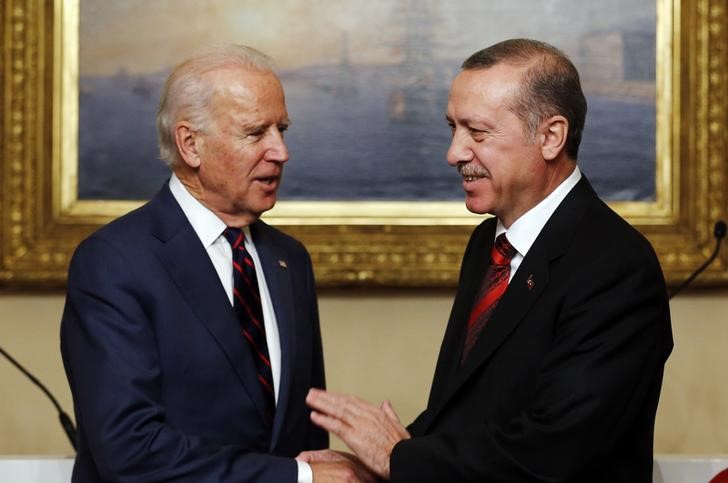By Jeff Mason and Humeyra Pamuk
RIGA/ISTANBUL (Reuters) - When U.S. Vice President Joe Biden visited Turkey in January, he struck a difficult balance between showing support for a NATO ally faced with multiple security threats while criticising its record on free speech and dissent.
Now, with relations between Washington and Ankara going through one of their testiest periods in recent memory, he may find it even tougher to get those dual messages across when he visits on Wednesday.
Biden will be the most senior U.S. official to visit Turkey since the failed July 15 coup, when a group of rogue soldiers tried to overthrow the government and killed at least 240 people.
Turkey says the failed putsch was orchestrated by the Muslim cleric Fethullah Gulen, who has lived in self-imposed exile in Pennsylvania for 17 years. Turkish President Tayyip Erdogan has called on the United States to extradite Gulen.
Washington has yet to do so, saying it needs clear evidence. That has angered Erdogan and sparked an outpouring of anti-Americanism from pro-government media.
The West, for its part, is worried by the widespread purges that followed the coup, in which some 40,000 people have been detained and 20,000 formally arrested.
Around 80,000 people have been sacked or suspended from the military, civil service, police and judiciary. Turkey says those institutions were infiltrated by Gulen's followers years ago in a bid to take over the state. Gulen denies this.
Biden, who visited Latvia on Tuesday, will look to show support with Turkey, while raising concern about the extent of the crackdown, according to officials. Turkey will press its case for Gulen's extradition.
"The vice president will also reaffirm that the United States is doing everything we can to support Turkey's ongoing efforts to hold accountable those responsible for the coup attempt while ensuring the rule of law is respected during the process," a senior Obama administration official told reporters, briefing ahead of Biden's visit on condition of anonymity.
WESTERN INSENSITIVITY
Turkey is both a NATO member and part of the U.S. coalition in the fight against Islamic State in Syria and Iraq - as well as a frequent target for the militant group. More than 50 people were killed in a suicide bombing over the weekend in the southeastern city of Gaziantep that may have been orchestrated by Islamic State.
U.S. relations have been complicated by that fight, in which Washington backs the Syrian Kurdish YPG rebels against Islamic State. Ankara is worried the YPG's advance emboldens Kurdish insurgents in its mainly Kurdish southeast. On Monday, Turkish artillery shelled YPG positions in northern Syria.
Erdogan has complained about what he sees as insensitivity from the West, saying Western countries have expressed more concern over the post-coup crackdown than the coup itself and Western leaders have been slow to voice support.
Erdogan has lashed out at Washington for failing to extradite Gulen. Some Erdogan supporters have tried to blame the United States for the coup. One newspaper said the attempt was financed by the CIA and directed by a retired U.S. army general. Both charges were vigorously denied.
A day after the failed putsch, the labour minister said it was clear "America is behind it", although Erdogan's spokesman later said he had spoken "in the heat of the moment".
Biden, who is due to meet with both Erdogan and Prime Minister Binali Yildirim during his one-day visit to Ankara, is widely seen as making the trip because of his ability to balance tough talk with messages of support.
"Unhelpfully, there have been some kind of off-the-record Turkish officials asserting that somehow the United States may have had some role. But as the vice president would say, all of that is malarkey," the U.S. official said. "We'll make that clear during the meetings and in our engagements with Turkish people."
SEMI-SWEET RELATIONS
At a weekend briefing with reporters in Istanbul, Prime Minister Yildirim said that while Gulen's extradition would top the discussion, Biden was also coming to improve relations.
"Why is Mr Biden coming? To make our semi-sweet relations sweet," he said, in a reference to Turkish coffee.
He said he wanted to see the extradition process sped up, and Gulen put under temporary arrest in the meantime.
Before the July 15 coup, Turkey had already submitted 84 dossiers on Gulen and his movement to U.S. authorities, and has since sent another four since the coup, Yildirim said.
A team from the United States was due to arrive in Turkey ahead of Biden's visit and meet with judicial institutions about the extradition, he said.
However, the U.S. official said Turkey had so far only submitted extradition requests based on events before the coup.

"Turkish authorities have put forward a number of extradition requests through our State Department and Department of Justice for Mr Gulen," he said. "As of now, the Turkish authorities have not come forward with a formal extradition request for Gulen based on the coup itself."